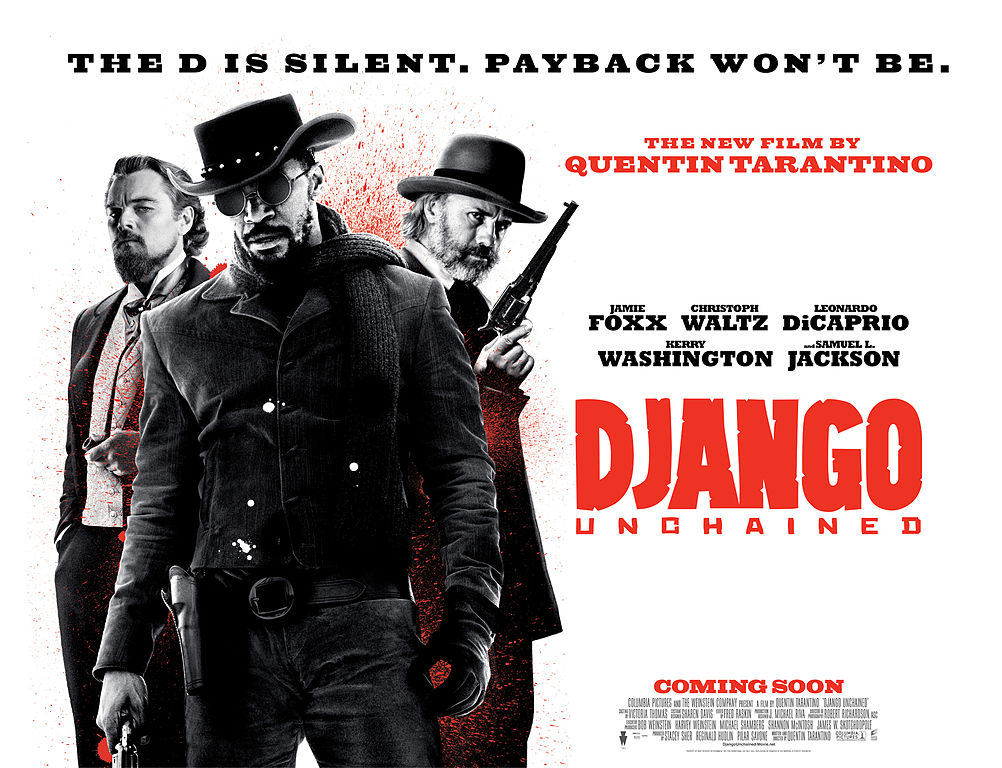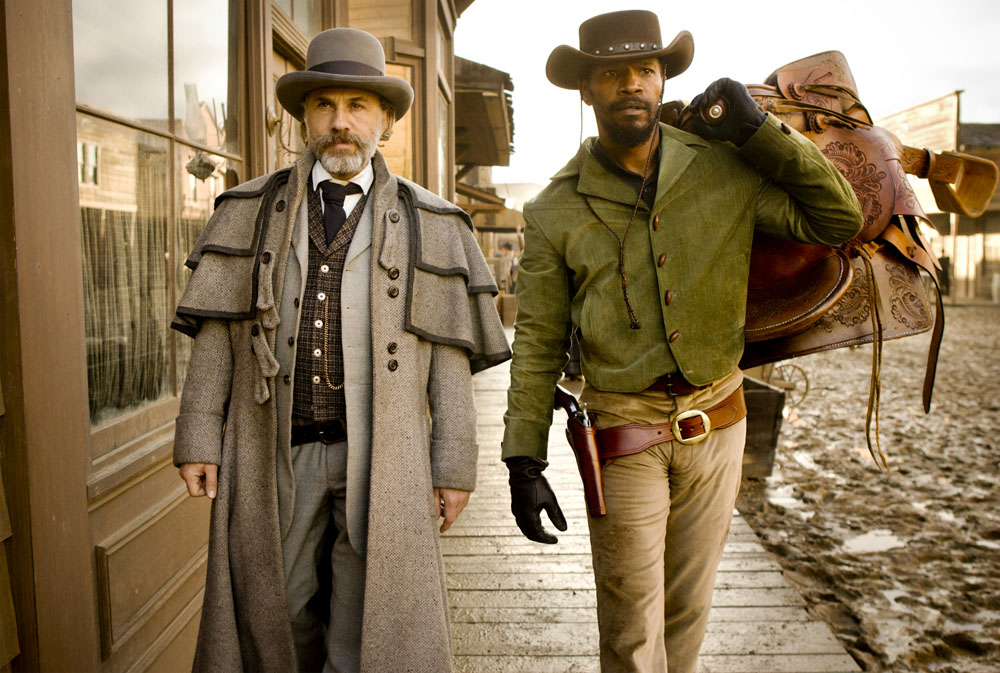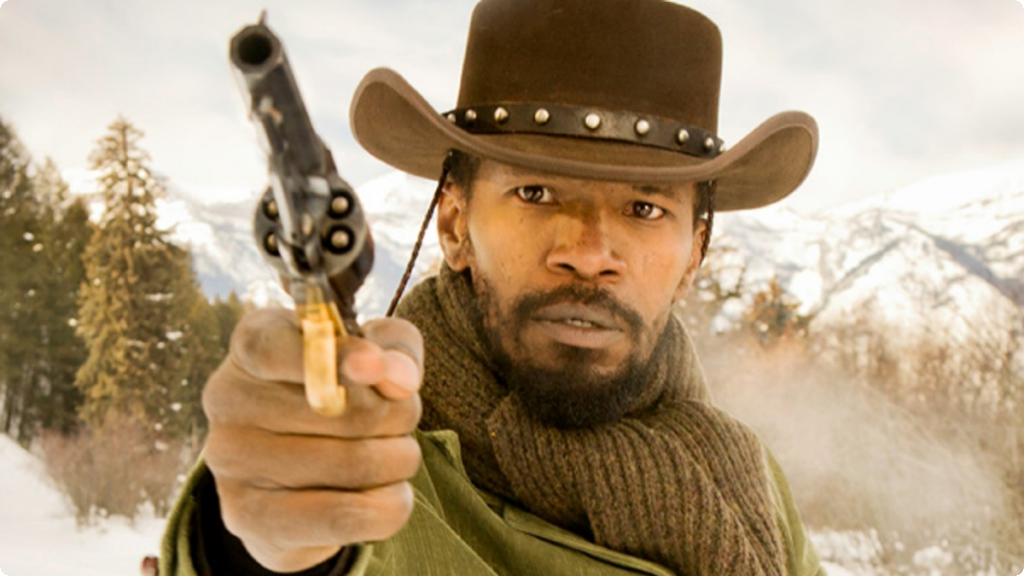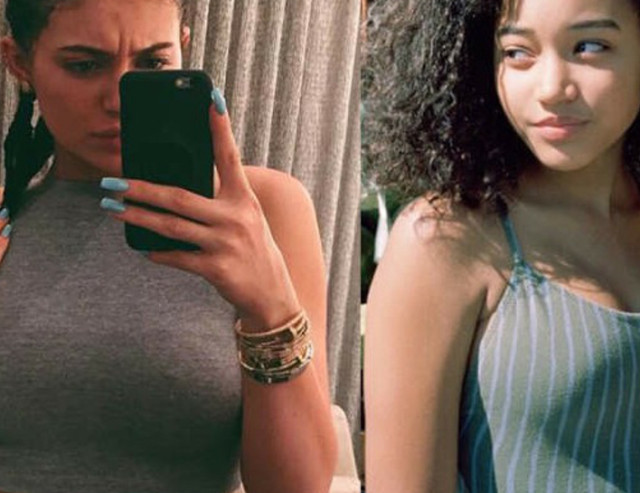American Slavery Was Not A Sergio Leone Spaghetti Western. It Was A Holocaust. My Ancestors [Were] Slaves. Stolen From Africa. I Will Honor Them.
~ Spike Lee (on VibeTV).
To which Prof. Michael Eric Dyson of Georgetown University & MSNBC responds (paraphrased):
Can’t be judging my book before you’ve read it.
This film on slavery in America is going down as a classic, whether you like it or not, and Spike Lee would have had something to do with it; because he came out and bashed it in his oftentimes bleeding emotions.
Quentin Tarantino may be ‘toying with Spike’s emotions’ but whether they are real or not, I hope it is not due to a reluctance to accept Tarantino, a white man, as a apt director of this mix of Blaxploitation and the Pastafied Western genre.

This is a bold film on slavery, by any standard, (especially) by a white filmmaker like Quentin Tarantino who’s had his share of racial missteps. To name the movie Django (the ‘D’ is silent) is itself an unadulterated comprehension of who these Africans were, and it is a steadfast undertaking by a director who may never call himself a descendant of the people who name their children Django.
And the moment Django was Unchained, your admiration of the film began. I have my criticisms of aspects of it. But I dock them for now, knowing true well that these emotions I have, belong rather to a broader spectrum of complex criticisms of an era; A period that propelled white men with guns – a tool Africans had thousands of years earlier invented and confined to their Temples – to summarily reduce the West African in America to the doldrums of sub-humanity and animality.
Django Unchained, as A.O. Scott puts it, ‘is unabashedly and self-consciously pulpy, with camera moves and musical cues that evoke both the cornfed westerns of the 1950s and their pastafied progeny of the next decade. It is digressive, jokey, giddily brutal and ferociously profane. But it is also a troubling and important movie about slavery and racism.’
It’s a black hero movie of some sort, a well crafted emancipation epic of a black man and shames the myriad emancipation organisms we have been hitherto inundated with in movies like the coveted Sweet Sweetbacks Badasssss Song by many a black film academics. Who said a black film cannot be bold, hot, intelligent, packed, disturbing and soothing at the same time?

No film, like Django Unchained, has ever drawn the moral and physical color line so inadvertently. White men in America with guns, were ready to use it, at any cost, to hunt, enslave and kill, especially the African. And it didn’t stop there, the monstrosity was in equal measure visited upon generation after generation, and like Django (starring Jamie Foxx), they still remained not just slaves, but absolute properties – ‘things.’
This fine but significant detail, the difference in the definition of slavery in white America as opposed to ‘servitude’ in other parts of the world is worth mentioning since its implementation in the relationship between two humans (slave and master) or a human and a ‘thing’ (in the American sense) make for tantalizing and catastrophic ramifications when carried to its excesses.
And Django Unchained undoubtedly has elucidated the difference.
Not to applaud one over the other! But one spectacle stands indelible in my memory in this respect. D’Artgnan’s (starring Ato Essandoh) flight into a tree, running away from the gnarling and gnashing teeth of three hungry uncouth bullpits eventually made me throw in the towel when the indecently flamboyant Calvin Candie (starring Leonardo Dicaprio) ordered his dogs loose on him. The dogs made ground beef of D’Artgnan – Candie’s ‘property.’ Such was the horror and the mental and/or godly ‘uprightness’ of the men who committed such evils.
He’s my property, and I can do as I please with him.
~ Calvin Candie
Besides the whipping, raping, hanging, dismembering, blowing heads open and even throwing slaves to the dogs for meat, there was ample room for laughter.
A gathering of hooded night riders (led by Don Johnson), and a late escapade (featuring Mr. Tarantino speaking in an Australian accent) that perhaps owes more to Bugs Bunny than to any other cultural archetype were pure lines of silliness.
Quentin Tarantino, unlike many other films, has forged here an effortless visual display of the conundrum of racism and in it, cooked up the warrant for us to be both obtusely amused and stupefyingly weepy.
Calvin Candie himself an amateur Craniologist reminds us in his preposterously fed Science or Eugenics, of the times when “the biggest part of the black man’s brain is servitude… and the biggest part of the white man’s brain is creativity” were common place in science books the world over.
But he quickly found himself breastfeeding on the ‘displeasing’ truth in Candyland – the writer of Mr. Candie’s favorite books, The Three Musketeers((French: Les Trois Mousquetaires)), ‘Alexandre Dumas, was black,’ as Dr. Schultz narrates to him.
Like, if any ‘race’ of people had the biggest ‘creative brain,’ it wouldn’t be black folk? Yah right!
It’s laughable in 2012 (it was science in 1848) but now, in some good faith, generally the racist world has discarded the folly in that kind of science. But don’t they still revert to other monstrous habits in 2012?

For example, as if putting black men in jail for weed, working them to death on 0.02 cents a week, stripping them of their civic rights when they do make it out, and ‘unleashing’ them into a structurally racist job market that is instructed not to particularly hire people with prison records, is not folly and uncouth enough. Someday, perhaps in 200 years, this too may equally warrant laughter. It’s insane no matter how deep we dig our heads into the sand in the face of these newly enlightened Jim Crow fanatics!
The history lessons in Django Unchained are uncoated nor are they exaggerated to their monstrous proportions, since I could perhaps do with a better hyperbole than Tarantino has meekly accomplished here, but filmmaker Quentin has nevertheless, by hook or crook, understood the remarkable disconnection of the two cultures even in the affairs of antagonism – that of the fighting techniques of the African (for example the Mandingo warrior) and it’s quantitative and aesthetic difference from the bazooka blazing, canon popping killing machines of the European gun tooting slave master.
As one rounded-up runaway Mandingo slave-fighter pleaded, ‘masser, I ain’t got it in me no more.’ Profuse with tears, he was no longer ready, after only three fights, to indulge his master in Mandingo warrior skills that only resulted in killing the opponent, his own kind – slaves.
This analysis of black men ‘killing’ one another for a white audience is one that rings clangs and cymbals in 2012 where more than 75 percent of the NFL and NBA are black men entertaining the white man, only this time for some of his money. But I am no expert here, so I digress.

But, even Django himself finds it instinctively irrational and difficult to shoot a white man he knows nothing about in his first job assignment by the Bounty Hunter, Dr. King Shultz (Christopher Waltz). He wouldn’t shoot until he was convinced that his target was actually a fugitive wanted for the murder of many Federal Carriage men.
See, only the prospect of killing men who had wronged him, flogged him, chained him, branded him and split him away from his family was worthy of its unholy course.
But of course, the doubters would insist it’s only like many westerns. That Django Unchained only latches onto a simple, stark picture of good and evil, and takes homicidal vengeance as the highest — if not the only — form of justice. To this end, they will claim, it is a far-fetched exercise in dichotomizing it into philosophical differences in European and African thought.
Except, this reading of the film lacks any deep insights into the art of storytelling or filmmaking. At its very basic interpretation however, it only underscores how much the Trans-Atlantic slave narrative in American History itself feeds so effortlessly into the Pastafied Western genre.
For when you wipe away the blood and the anarchic humor, what you see in Django Unchained is moral disgust with slavery, instinctive sympathy for the underdog and an affirmation (in the relationship between Django and Schultz) of what used to be called brotherhood before white men from Western Europe set foot on the West African coast.
Nothing can mimic the monstrosity suffered by Africans in America and Spike Lee is probably right in some respects when he says, ‘American Slavery Was Not A Sergio Leone Spaghetti Western. It Was A Holocaust. My Ancestors [Were] Slaves. Stolen From Africa. I Will Honor Them.’
But he shuts the door on a very bold film!

What can I say? Django (starring Jamie Fox) and Broomhilda Von Shaft (starring Kerry Washington) were breathtakingly magnificent in their roles. This is perhaps the only time I will say they are ‘naturals,’ but pardon me. And where did Samuel L. Jackson (playing Stephen) come from? Stephen was the ‘house negro’ you do not wonna go to war with. He knows both sides, and he knows them very well!
This film spells out more than I can chew in one writing. But I point out my parochial takeaways here. When you watch it, you can also alert me of your newfound opinions. I am cocksure you will be soaking with them!










Nice read. Haven’t yet seen the film but i look forward to it. Spike Lee might not know it but his comments just might make people wanna see the film more.
I like cowboy action in this movie.
Hiya! I just would like to give an enormous thumbs up for the great data you’ve gotten right here on this post. I might be coming back to your blog for more soon.
Stephen is a mean ma*f*cker! Daimn